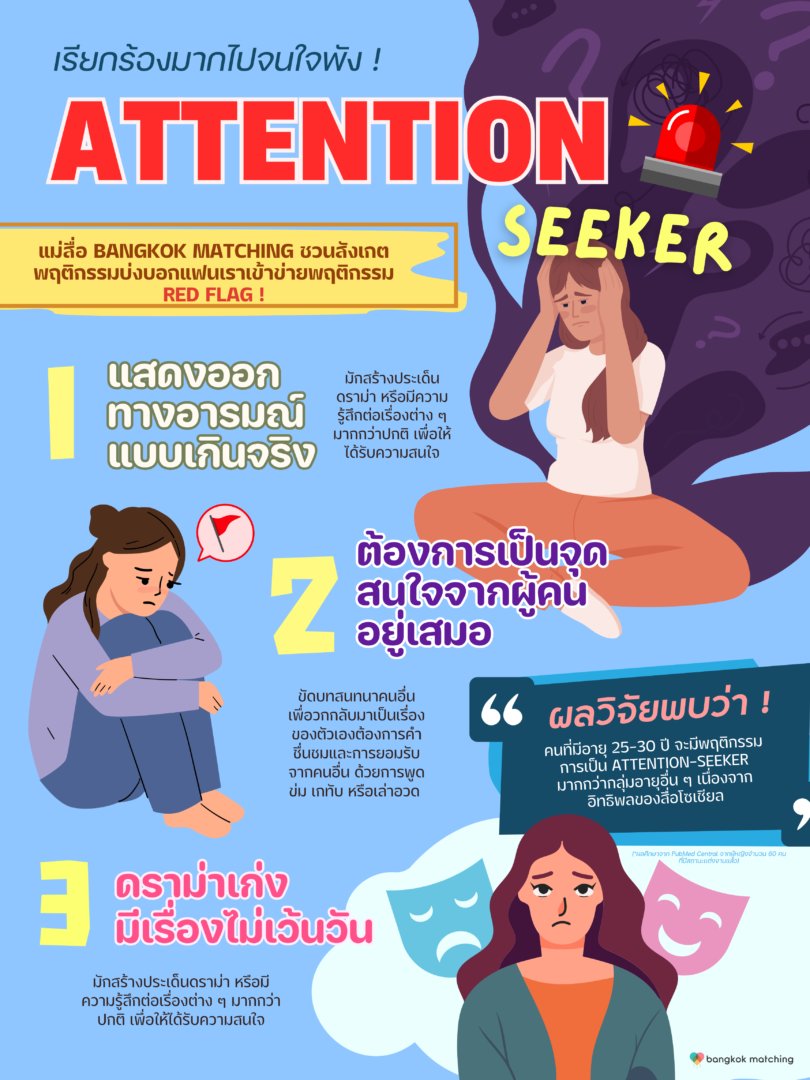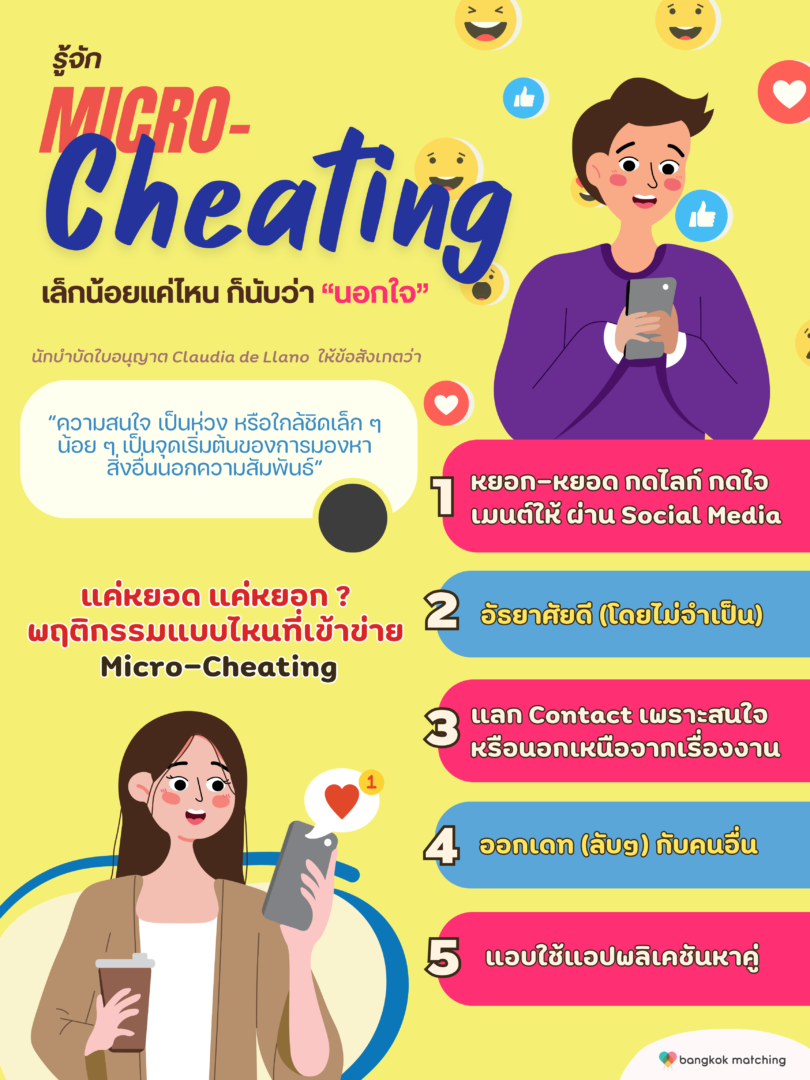Seeking too much attention can lead to heartbreak! Being an ‘attention-seeker’ is a major red flag in relationships.
Table of Contents
ToggleSeeking Too Much Attention Can Break a Relationship: “Attention-Seeking” Is a Major Red Flag. In any romantic relationship, it’s completely natural to want attention from your partner. However, at Bangkok Matching, a high-end matchmaking company, we believe that when this need for attention becomes excessive, even the most stable relationship can become strained. The constant demand to “fill” a partner’s emotional needs may be a sign of a major red flag—one that could lead to a toxic relationship.
This behavior often falls under what is known as attention-seeking—a pattern of needing constant validation and emotional reassurance that, no matter how much is given, never seems to be enough. Over time, this can create emotional exhaustion and discomfort for the other partner.
-
What Is an Attention-Seeker, and Why Does It Often Appear in Romantic Relationships?
An attention-seeker is someone who frequently displays behaviors intended to draw attention to themselves, regardless of how disruptive or negative those behaviors might be. The term refers to people who crave constant focus and emotional input from others, often disregarding the well-being or boundaries of those around them.
This type of behavior is common in romantic relationships, as love naturally comes with the desire for care, understanding, and emotional support. However, when one partner expects to be the constant center of attention, it can become overwhelming. They may start using negative or exaggerated behaviors to pull attention back to themselves—such as interrupting the partner’s daily life, or displaying over-the-top emotional reactions like crying or creating drama unnecessarily.
-
Study Findings: Why Attention-Seeking Is on the Rise
A study published by PubMed Central examined 60 married women who showed higher-than-average levels of attention-seeking behavior in their relationships. It revealed that women aged 25–30 exhibited these behaviors more frequently than other age groups. The key driver? The increasing influence of social media and digital culture.
As people share more of their personal lives online, many develop a heightened need to feel seen, heard, and validated. This overexposure and craving for attention can take a toll on mental health—and by extension, on relationships.
-
How to Tell If Your Partner Is an Attention-Seeker—and What You Can Do About It
In a romantic relationship, giving and receiving attention is natural. Acts of care, affection, and attentiveness are essential to building a healthy bond. At Bangkok Matching, we’re not suggesting you stop paying attention to your partner—in fact, quite the opposite. But when it starts to feel like you’re the only one constantly pouring emotional energy into the relationship, and you’re left feeling drained or unappreciated, it could be a red flag. You may be dealing with a partner who’s crossing the line into attention-seeking behavior.
-
Signs Your Partner May Be an Attention-Seeker
Here are a few behavioral patterns commonly seen in romantic partners who seek excessive attention:
- Overly Dramatic Emotional Responses
They express emotions in a way that’s out of proportion to the situation—for example, crying loudly in public when their demands aren’t met, or acting like a victim in a situation that isn’t actually severe. These reactions are often designed to attract attention and sympathy, even if the actual event is minor.
- Interrupting Conversations or Always Steering Topics Back to Themselves
You might notice that they regularly interrupt discussions to talk about themselves or exaggerate personal stories to gain admiration. They might even one-up others’ experiences to keep the spotlight on themselves.
- Creating Drama Out of Small Issues
Attention-seekers often have a knack for turning small problems into major confrontations. This could include picking fights, fabricating stories, or bringing up minor grievances and blowing them out of proportion to make their partner feel guilty or anxious.
-
What Research Says About Attention-Seeking Behavior
A study conducted by Sedona Sky Academy suggests that attention-seeking tendencies often stem from childhood emotional wounds or a lack of validation in earlier life stages. This behavior can also be linked to low self-esteem or a desire to control or dominate others in relationships.
The same patterns were observed in a study cited by PubMed Central, which focused on married women aged 25–30. Researchers found that social media use, where constant validation is normalized, has played a major role in reinforcing attention-seeking tendencies. Overexposure online has increased the need for external recognition and emotional reassurance, often leading to mental health issues and strained romantic relationships.
-
How to Handle a Partner with Attention-Seeking Behavior
Here are a few professional tips from Bangkok Matching’s matchmaking experts for managing a relationship with someone who may be showing red flag behavior related to excessive attention-seeking:
- Give Enough Attention—But Know Your Limits
Before labeling your partner as an attention-seeker, consider whether you may have been unintentionally neglecting their emotional needs. If so, try to offer more consistent and sincere attention. However, balance is key—you shouldn’t feel obligated to overcompensate.
- Seek to Understand the Behavior
Try to understand the root of your partner’s behavior. Are they feeling insecure, lonely, or still carrying emotional wounds from the past? Recognizing that their behavior may stem from deeper issues can help you respond with empathy—without enabling toxic patterns.
- Communicate Openly and Kindly
Clear, respectful communication is essential. Let your partner know how their behavior makes you feel, and ask them to share their own needs and insecurities. A non-confrontational, heart-to-heart conversation can often resolve more than constant arguing ever could.
- Consider Professional Help If Needed
If open communication doesn’t yield results, or if the emotional burden becomes too heavy, it may be time to seek guidance from a relationship counselor or therapist. These professionals can help both partners understand their roles, set boundaries, and rebuild a healthier dynamic.
Final Thoughts
If your partner constantly seeks validation to the point where it’s affecting your mental health and the health of your relationship, it’s not something to ignore. Sweeping the issue under the rug will only delay emotional fallout.
And remember—building a long-lasting relationship requires emotional maturity, self-awareness, and mutual respect. Addressing attention-seeking behavior early on can help prevent long-term emotional distress and create space for a stronger, more balanced partnership.





